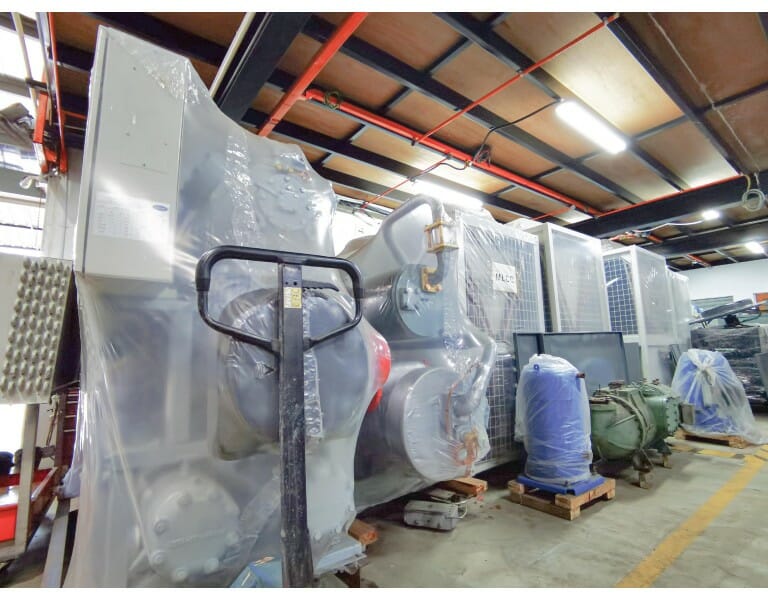The Environmental Impact of Air Cooled Chillers and How They Compare to Water Cooled Chillers
Introduction
Air cooled chillers and water cooled chillers are commonly used in various industries for cooling purposes. However, it is essential to understand their environmental impact and compare their sustainability. This article explores the environmental implications of air cooled chillers and water cooled chillers, highlighting their differences and evaluating their eco-friendliness.
Table of Contents
- Introduction
- Understanding Chillers
- Environmental Impact of Air Cooled Chillers
- Environmental Impact of Water Cooled Chillers
- Comparison Between Air Cooled Chillers and Water Cooled Chillers
- Conclusion
- FAQs
- Are air cooled chillers more energy-efficient than water cooled chillers?
- Can water cooled chillers save water compared to air cooled chillers?
- Which type of chiller is more suitable for urban areas?
- Do air cooled chillers require less maintenance?
- How does the initial cost of air cooled chillers compare to water cooled chillers?
- Get Access Now: https://bit.ly/J_Umma
Understanding Chillers
Before delving into the environmental impact, let’s understand the basic concept of chillers. Chillers are refrigeration systems used to cool or dehumidify air, water, or other fluids. They find applications in various industries, including HVAC systems, industrial processes, data centers, and commercial buildings.
Chillers work by extracting heat from a fluid, lowering its temperature, and then circulating it to cool the desired area or equipment. Air cooled chillers use air as the medium to remove heat, while water cooled chillers utilize water for this purpose.
Environmental Impact of Air Cooled Chillers
Energy Efficiency
One significant environmental consideration is the energy efficiency of air cooled chillers. These chillers require external fans to dissipate heat, consuming substantial amounts of electricity. The energy consumption of air cooled chillers can contribute to increased carbon emissions and electricity demand.
Noise Pollution
Another aspect to consider is the noise pollution caused by air cooled chillers. As the fans operate to remove heat, they can generate considerable noise levels. This can be a concern, especially in residential areas or places where noise regulations are in place.
Refrigerant Leakage
Air cooled chillers use refrigerants to facilitate the heat exchange process. However, if there are refrigerant leaks, it can have adverse effects on the environment. Some refrigerants, such as hydrochlorofluorocarbons (HCFCs) or chlorofluorocarbons (CFCs), are known to deplete the ozone layer and contribute to global warming.
Heat Island Effect
Air cooled chillers release heat into the surrounding environment, which can contribute to the urban heat island effect. In densely populated areas with numerous air cooled chillers, the overall temperature can rise, leading to increased energy demand for cooling and impacting local climates.
Environmental Impact of Water Cooled Chillers
Water Consumption
Water cooled chillers require a constant supply of water for their cooling process. This can result in significant water consumption, especially in regions with water scarcity or drought conditions. The large volumes of water used by these chillers can strain local water resources.
Discharge of Heat
Water cooled chillers discharge heat by transferring it to a cooling tower, which then releases it into the atmosphere. While this process does not directly emit greenhouse gases, it can affect local microclimates by increasing the ambient temperature.
Potential for Legionella Growth
Water cooled chillers provide an environment that can promote the growth of Legionella bacteria if not properly maintained. Legionella is responsible for Legionnaires’ disease, a severe form of pneumonia. Adequate water treatment and regular maintenance are crucial to prevent this health risk.
Comparison Between Air Cooled Chillers and Water Cooled Chillers
When comparing air cooled chillers and water cooled chillers, several factors come into play. Let’s assess their differences in terms of energy efficiency, water consumption, noise pollution, and maintenance and operational costs.
Energy Efficiency Comparison
Air cooled chillers generally have lower energy efficiency compared to water cooled chillers. The need for external fans in air cooled chillers increases energy consumption, while water cooled chillers leverage the cooling properties of water more effectively.
Water Consumption Comparison
While air cooled chillers do not require a constant water supply, water cooled chillers consume significant amounts of water. In areas where water conservation is a priority, air cooled chillers can be a more sustainable choice.
Noise Pollution Comparison
Air cooled chillers tend to produce higher noise levels due to the operation of fans. Water cooled chillers, on the other hand, generate lower noise levels, making them preferable in noise-sensitive environments.
Maintenance and Operational Costs Comparison
Air cooled chillers generally have lower maintenance and operational costs compared to water cooled chillers. Water cooled chillers require regular maintenance, water treatment, and the operation of cooling towers, which can increase overall costs.
Conclusion
Both air cooled chillers and water cooled chillers have their environmental implications. Air cooled chillers contribute to energy consumption, noise pollution, and potential refrigerant leakage. Water cooled chillers, on the other hand, consume significant amounts of water and can impact local microclimates.
The choice between air cooled and water cooled chillers depends on various factors, including the availability of water, noise regulations, energy efficiency requirements, and maintenance costs. Assessing these factors will help determine the most suitable option for specific applications.
FAQs
- Are air cooled chillers more energy-efficient than water cooled chillers?
Air cooled chillers are generally less energy-efficient compared to water cooled chillers due to the need for external fans. - Can water cooled chillers save water compared to air cooled chillers?
No, water cooled chillers consume significant amounts of water for their operation, whereas air cooled chillers do not require a constant water supply. - Which type of chiller is more suitable for urban areas?
Water cooled chillers, despite their water consumption, are generally more suitable for urban areas due to their lower noise pollution levels. - Do air cooled chillers require less maintenance?
Yes, air cooled chillers generally require less maintenance compared to water cooled chillers, which involve cooling tower maintenance and water treatment. - How does the initial cost of air cooled chillers compare to water cooled chillers?
Air cooled chillers typically have lower initial costs compared to water cooled chillers, making them more affordable for certain applications.
Get Your Best Air-Cooled Chiller in Malaysia!
Get yourself and your company some of the highest-end chillers in the market. You should never have to worry about having to fret about breakdowns or inefficient machinery. AMCON is your best chiller choice. Go to https://amcon.com.my/ to purchase the best air-cooled chiller in Malaysia.



